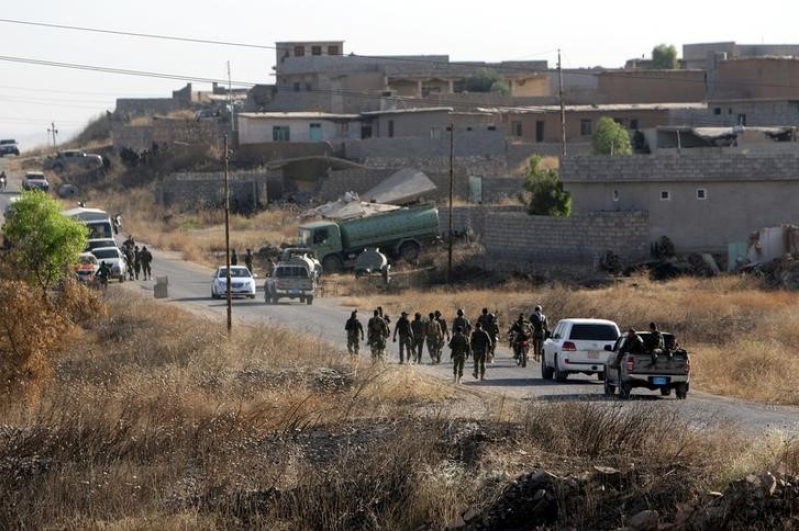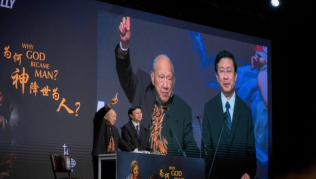
Under a scorching sun, men in northern Iraq work to replace dirt roads with asphalt as a mechanical paver rumbles nearby.
The laborers are from Harshm camp, which is sheltering 1,500 people who fled their homes when Islamic State seized Iraq's second biggest city, Mosul, in June 2014.
There are some 3.4 million Iraqis like them, people uprooted in their own country.
Aid workers fear a planned offensive to retake Mosul, Islamic State's de facto capital in Iraq, later this year will result in fresh displacement and a deeper humanitarian crisis.
"We hope that they will be able to go back home, but how and when, no one knows," Harshm camp manager Ahmad Abdo told the Thomson Reuters Foundation. "Roads are being paved and people are realizing that (living in a camp) is more long-term."
Ahead of the two-year anniversary of Mosul's capture by the group also known as ISIS, the Thomson Reuters Foundation interviewed several displaced Iraqis about their experience:
OMAR MOHAMMAD, 35, SUNNI ARAB:
On the day Islamic State seized Mosul, Omar Mohammad, then a policeman, received orders from his superiors to leave the city.
"When the army pulled back, we did too because we had no weapons," the father of three recalled.
Unlike many men who fled, Mohammad was able to find a job as a cleaner in an exclusive gated residential compound in Erbil, the capital of Iraq's Kurdish region.
However, he said he never received his full salary and quit after two months. "We were begging them to give us money, they only gave us part of it," he said.
Over the past two years Mohammad has taken to selling food and other items he receives from aid organizations to make up for the lack of income. But still, he says, the money is never enough for his family.
The young father is sheepish about inviting guests inside his prefabricated shelter. He would rather chat outside - the family cannot afford a cooling system and their living room is dark and stifling.
But perhaps Mohammad's biggest worry is the family's mental health which he says is deteriorating. His wife and children left Mosul after him.
"My oldest child has become paranoid because when they left Mosul they saw a lot of beheaded bodies and heard gunshots," Mohammad said, lighting a cigarette. "At night he's afraid of the dark and he loses his temper quickly."
For Mohammad life inside the camp is often suffocating. With too much time on his hands he often reminisces about the days he used to patrol Mosul and blames the Iraqi government for the city falling into Islamic State hands.
"I don't think Mosul will be liberated for another one or two years. If I have the money maybe I will emigrate to Sweden," he said.
AZIZA, 32, KURDISH
Aziza hands her iPhone to her daughter in an effort to distract the squirming toddler. "She has asthma and needs medical help," said Aziza, who requested anonymity.
With her husband and four children, Aziza fled their hometown, just 15 km (10 miles) from Mosul, as the battle for control of the area drew near.
Since moving to Erbil Aziza's husband has been unable to find a job, forcing the family to borrow money to buy medication for their young daughter.
While her family is safe inside the gated camp, there are daily hardships. The local government has decided to limit water to 50 liters per person from some 160 liters for the summer months when water becomes scarce in Iraq.
"Ramadan is coming and so is the summer. We need water," said Aziza, wearing a typically Kurdish dress and headscarf.
Sharing her stories with a smile, Aziza remained composed until she started speaking of her hometown.
"I miss my house and my relatives," she said, burying her face in her hands. "God will punish the people who did this to us."
JAMAL QASSEM ALI, 30, SHABAK
Jamal Qassem Ali named his youngest son Iraqi, "in case Iraq falls and we have to leave". That way, he and his family would always be reminded of their country, he said.
Ali belongs to the Shabak community, an ethno-religious minority comprised primarily of Shi'ite Muslims. Like the Yazidis, Shabak people were considered 'infidels' by Islamic State and targeted.
When Ali and his family left Mosul for the safety of Erbil they slept on the street for the first few weeks.
"Now it's better because we're in a compound but it's not easy to live here," he said.
Despite fleeing war, Ali decided to join the Kurdish military and return to the frontline, "firstly to defend our country and secondly for the money," he said.
But like most Kurdish soldiers, Ali is a victim of the region's financial crisis. He has not received his salary in months, and when he does get paid, half of it is spent on transport to the frontline.
Back in Mosul, Ali owned a bird shop where he made between 10,000 ($8) and 15,000 ($12) dinars a day. Two years on, he says he can't even make 1,000 dinars a day.
Would he ever consider leaving Iraq?
"I don't even have money to take a taxi, how can I leave?" he said.
HUSSEIN RADHA, 63 AND SLEMAN SALEH, 62, SHABAK:
"The day we left Mosul was like Judgment Day," said Hussein Radha, sitting in the shade next to his friend Sleman Saleh.
Radha and his family fled Mosul by foot and walked for hours before they found someone who could drive them to Erbil. When they arrived, they first stayed in an empty school before moving into the camp.
"I've not found a job since we moved here. We've been living off aid but there is not as much help as people think," he said.
Saleh nodded in agreement.
"I was a farmer back home. I grew wheat and barley, now I've no work," he said. "People have no money to buy clothes."
Both men said they would still be able to co-exist with their Sunni Arab neighbors. "As long as they've not helped ISIS I can live with them," Saleh said.
"I'm an old man, we just want to go home. We hope God will help us settle back."
MAY HADAYA, 30, CHRISTIAN:
May Hadaya and her family were among the last people to leave their hometown of Qaraqosh, just east of Mosul, in the summer of 2014.
Unlike many displaced Iraqis who found shelter in camps, the Hadaya family was able to rent a two-bedroom house in Erbil's Christian quarter, which they share with six people.
"This is not home, it's a place to sleep. Home is where your memories are," said Hadaya, recalling her spacious family home and lush garden.
"The conflict has affected every community, every class. Before there was the rich, the middle class and the poor. Now we're all in the same situation."
Despite living in a house, Hadaya's family has been unable to come to terms with their new lives.
"My father is someone else, always thinking about his land," Hadaya said.
"Over the last two days (the military) has said they would liberate our city and so my mother has been talking about going back and cleaning the house.
"It's very difficult for me to see her in this situation, a house that is not her home, a city that is not her city."







